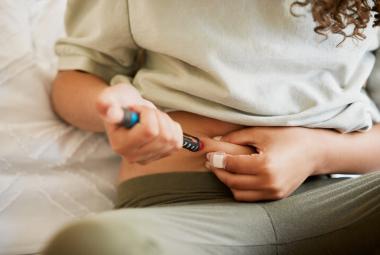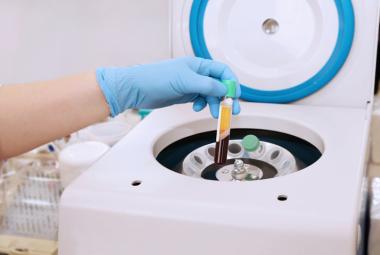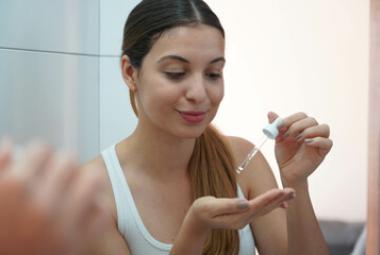While vegan diets have been common in certain cultures for centuries, vegan diets are becoming increasingly popular worldwide. Evidence suggests that vegan diets may prevent long-term health consequences such as coronary heart disease, cancer, and type 2 diabetes.1 Vegan diets may be followed for socioeconomic, ethical, or environmental reasons, or spiritual/religious beliefs. Approximately 2% of the US population follows a vegan diet.2,3
A vegan diet excludes all animal products including meat, dairy products, eggs, and honey. It includes a wide variety of plant foods like grains, legumes, nuts, seeds, vegetables, and fruit. Compared with typical Western diets, vegan diets tend to contain less saturated fat and cholesterol and more dietary fiber.4 However, plant-based diets that exclude all animal products may be lacking in certain key nutrients, including iron, vitamin B12, vitamin D, calcium, choline, and iodine.5 Deficiencies of these nutrients during lactation have the potential to cause adverse effects.
Requirements for many nutrients increase during lactation to supply adequate essential nutrients for infant development. According to the CDC, “Breastfeeding mothers generally need more calories to meet their nutritional needs while breastfeeding. An additional 330 to 400 kilocalories (kcal) per day is recommended for well-nourished breastfeeding mothers, compared with the amount they were consuming before pregnancy.”5 Requirements for many micronutrients also increase as they are needed for secretion into breast milk as well as for the mother’s own wellbeing.6
Below, we review specific micronutrients that may be lacking in a classic vegan diet that are important during lactation.
IODINE
Iodine is a vital component of thyroid hormones thyroxine (T4) and triiodothyronine (T3). The mother’s thyroid hormone levels affect proper fetal growth and neurological development during pregnancy and after birth.7 Food sources of iodine include fish, shellfish, seaweed, and iodized table salt. Although breast milk contains iodine, concentrations can vary based on maternal iodine levels. If a pregnant or breastfeeding woman is deficient in iodine, the fetus or infant may be at risk for iodine deficiency and associated cognitive and psychomotor impairments. Shaikh et al.8 reported a case of transient neonatal hypothyroidism due to a maternal vegan diet deficient in iodine. Both mother and baby had abnormal thyroid function tests as well as goiters, enlargement of the thyroid gland in the neck that results from iodine deficiency. Thyroid function normalized after treatment with levothyroxine and iodine. Breast milk from vegan and vegetarian mothers on average contained less iodine than the estimated requirement for infants 0 to 6 months old.9 Average breast milk iodine levels were 89 mcg/L, 116 mcg/L, and 276 mcg/L, for samples from vegans, vegetarians, and omnivores, respectively.
Recommendations: The American Thyroid Association and the American Academy of Pediatrics recommend that pregnant or breastfeeding women take a daily multivitamin or prenatal supplement every day containing 150 µg of iodine.10,11
IRON
Iron is necessary to make hemoglobin, the component in red blood cells that carries oxygen in throughout the body; it also supports neurological development during infancy and early childhood. Inadequate iron leads to fatigue, anemia, and impaired development. Meats, poultry, and seafood are high in heme iron, a form that is absorbed well. Beans, lentils, and vegetables like spinach contain non-heme iron, a less absorbable form of iron.
Vegan mothers and their infants have higher risk of iron deficiency and anemia.12,13 During pregnancy, the majority of iron is transferred from the mother to the fetus in the third trimester. Mothers with good iron stores transfer sufficient iron to their term newborns to last for about the first 6 months of life, whereas mothers with low iron stores transfer less iron to their infants, who are then born with low iron stores.
All breast milk is low in iron regardless of the mother’s status. Thus, by 6 months of age all breastfed infants require another source of iron in addition to breast milk.14 Iron needs can be met through the introduction of iron-rich foods, iron-fortified cereals, or iron supplement drops. Breastfed infants who are born with low iron stores may need iron supplementation earlier in life.
Recommendations: In mothers aged 19-50, the Recommended Dietary Allowance (RDA) is 27 mg during pregnancy and 9 mg during lactation. For children aged 7-12 months, the RDA is 11mg.15 Absorption of non-heme iron can be enhanced by consuming a good source of vitamin C along with these foods.
VITAMIN B12
Vitamin B12 (cobalamin) plays an essential role in red blood cell formation, cell metabolism, nerve function, and the production of DNA. Food sources of vitamin B12 are primarily animal source foods, including poultry, meat, fish, and dairy products. Vitamin B12 is also added to some foods, such as fortified breakfast cereals or enriched soy/rice milk, and is available as an oral supplement. Vitamin B12 is transferred through the placenta to the fetus during pregnancy and through breast milk after birth. Vitamin B12 is lower in breast milk of vegans and vegetarians compared to nonvegetarians.16
Infants need vitamin B12 to support brain development and produce healthy red blood cells. Infants who do not get adequate vitamin B12 can become deficient. Untreated vitamin B12 deficiency in infants can lead to permanent brain damage.17 It can also lead to anemia, fatigue, muscle weakness, intestinal problems, and nerve damage. Cases of severe vitamin B12 deficiency have been reported in infants exclusively breastfed by vegan mothers; in such cases treatment with blood transfusion and vitamin B12 administration may be required.18
Recommendations: Vitamin B12 supplements are recommended for women who follow vegetarian or vegan diets and are pregnant or breastfeeding exclusively. The recommended daily intake in lactating women is 2.8 mcg and for infants aged 6 months or less is 0.4 mcg.19
VITAMIN D
Vitamin D is needed to support healthy bone development and to prevent rickets, a condition that causes weak or deformed bones. Lemonine et al.20 reported a case of nutritional rickets in an infant following a vegan diet after being breastfed by a vegan mother, presenting with psychomotor regression and 4 bone fractures. Vitamin D deficiency rickets among breastfed infants is rare, but it can occur if an infant does not receive additional vitamin D from foods, a vitamin D supplement, or adequate exposure to sunlight.21 Good sources of vitamin D are found in fish, liver oils, fatty fish, and egg yolks. Breast milk alone does not provide adequate vitamin D for infants. Interestingly, Ureta-Velasco et al.22 showed that breast milk of vegans was lower in vitamin D compared to omnivores (1.10 mcg/L for vegans vs. 3.43 mcg/L for omnivores). However, it is recommended that all breastfed infants receive vitamin D supplementation.
Recommendations: The Dietary Guidelines for Americans and American Academy of Pediatrics recommend breastfed and partially breastfed infants be supplemented with 400 IU per day of vitamin D beginning in the first few days of life.21
CALCIUM
Calcium is a mineral that, along with vitamin D, is necessary for healthy bones and teeth. Calcium also plays an important role in blood clotting, helping muscles to contract, and regulating normal heart rhythms and nerve functions.23 Calcium deficiency in childhood may result in not reaching full potential adult height. Later in life, it can result in low bone mass or osteoporosis. Calcium must be obtained from diet. Good sources of calcium include many dairy products, as well as some dark green leafy vegetables like spinach and kale. In order to absorb calcium, the body requires vitamin D.
Calcium is transferred into breast milk at the expense of the mother’s calcium stores. Breast milk calcium comes from increased maternal bone resorption (release of calcium from bones), increased calcium absorption in the intestines, and, to a lesser extent, dietary intake.24 Calcium content of breast milk for vegans and omnivores has been found to be similar, indicating that breastfed infants of vegan mothers likely receive adequate calcium.22 However, maternal deficiency of calcium coupled with bone adaptation to provide adequate calcium in milk may pose a risk for maternal bone health, including osteoporosis24.
Recommendations: During pregnancy and lactation, adequate calcium intake is considered to be 1000 mg/day. Vegetarians and vegans should consume 1200 to 1500 mg/day of calcium, 20% more than omnivores.5
DHA
Docosahexaenoic acid (DHA) is an omega-3 fatty acid found in cold water fatty fish, including salmon and tuna. Omega-3 fatty acids are good for the cardiovascular system and are necessary for infant neurological development. Infants need DHA, especially during the first 6 months of life, for brain, eye, and nervous system development. One study showed that infants deficient in DHA were at increased risk of lower language development.25 DHA-deficient infants also showed delayed maturation of visual acuity.25 Ureta-Velasco et al.22 found that breast milk DHA levels were 0.15% for vegans vs. 0.33% for omnivores. DHA intake among vegan mothers was 0.14 g/d vs 0.53 g/d for omnivores.
Maternal supplementation with DHA has shown to increase breast milk DHA content.26 DHA is available as a supplement in two common forms: Fish oil capsules, which has both DHA and EPA (eicosapentaenoic acid), another omega-3 fatty acid. Or DHA from algae, which has no EPA.
Recommendations: A minimum daily DHA intake of 200 mg/day is recommended for pregnant and lactating women to support both maternal and infant health.26
CHOLINE
Choline is an essential nutrient involved in many processes such as cell structure and messaging, fat transport and metabolism, DNA synthesis and nervous system maintenance. The liver can make small amounts of choline, but the rest is primarily obtained through diet. Rich food sources of choline include beef liver, eggs, and fish. Some plant-based food contain choline; however, unusually large quantities would need to be consumed to meet the daily requirement. Choline is especially important during pregnancy, as a low intake may raise the risk of neural tube defects in unborn babies.27 It is also crucial in infancy while the brain continues rapid growth. Ureta-Velasco et al.22 found a 5% decrease in breast milk phosphatidylcholine levels for vegans compared to omnivores.
Recommendations: Breastfeeding women are recommended to consume 550 mg of choline daily throughout the first year postpartum (100mg more than is recommended prior to pregnancy) in order to meet the demands of herself and her baby.28 Prenatal supplements typically do not contain substantial amounts of choline; thus, mothers may require an extra choline supplement.
SUMMARY
Although, a vegan diet may have certain advantages and can be safe during lactation, the avoidance of animal-based foods in the diet increases risk of nutrient deficiencies. Mothers following a vegan diet may have decreased intake and breast milk content of essential nutrients such as iodine, DHA, vitamin B12, vitamin D, and choline. Children who consume breast milk that is deficient in these key nutrients are at risk of failure to thrive, anemia, delayed/regressed psychomotor development, hypothyroidism, and rickets. Lactating vegan mothers are also at risk for anemia and osteoporosis. It is important for breastfeeding mothers consuming vegan diets to be aware of key nutrients, and a possible need for supplementation. We recommend that vegan mothers consult their healthcare provider or a Registered Dietitian to optimize nutrient intake during pregnancy and while breastfeeding for their own health and that of their infants.
Ashley Rook, MS4
Christine D. Garner, PhD, RD, CLC
References
- Sebastiani G, Herranz Barbero A, Borrás-Novell C, et al. The Effects of Vegetarian and Vegan Diet during Pregnancy on the Health of Mothers and Offspring. Nutrients. 2019;11(3):557. Published 2019 Mar 6. doi:10.3390/nu11030557
- Cramer H, Kessler CS, Sundberg T, et al. Characteristics of Americans Choosing Vegetarian and Vegan Diets for Health Reasons. J Nutr Educ Behav. 2017;49(7):561-567.e1. doi:10.1016/j.jneb.2017.04.011
- Šimčikas, S. Is the percentage of vegetarians and vegans in the U.S. increasing? Animal Charity Evaluators. https://animalcharityevaluators.org/blog/is-the-percentage-of-vegetarians-and-vegans-in-the-u-s-increasing/?gad=1&gclid=CjwKCAjw-IWkBhBTEiwA2exyO0ZHNJ-5S-pBKp5zEbLw2_WxDKY4aLl499HBijO-fLIOQWaQlhY7rRoCVykQAvD_BwE#Graph1. Published Sept 26, 2020. [Accessed August 22, 2023].
- Craig WJ. Health effects of vegan diets. Am J Clin Nutr. 2009;89(5):1627S-1633S. doi:10.3945/ajcn.2009.26736N
- Melina V, Craig W, Levin S. Position of the Academy of Nutrition and Dietetics: Vegetarian Diets. J Acad Nutr Diet. 2016;116(12):1970-1980. doi:10.1016/j.jand.2016.09.025
- Maternal diet. Centers for Disease Control and Prevention. https://www.cdc.gov/breastfeeding/breastfeeding-special-circumstances/diet-and-micronutrients/maternal-diet.html#. Published May 17, 2022. [Accessed August 22, 2023].
- Iodine. Centers for Disease Control and Prevention. https://www.cdc.gov/breastfeeding/breastfeeding-special-circumstances/diet-and-micronutrients/iodine.html. Published April 4, 2023. [Accessed August 22, 2023].
- Shaikh MG, Anderson JM, Hall SK, Jackson MA. Transient neonatal hypothyroidism due to a maternal vegan diet. J Pediatr Endocrinol Metab. 2003;16(1):111-113. doi:10.1515/jpem.2003.16.1.111
- Pawlak R, Judd N, Donati GL, Perrin MT. Prevalence and Predictors of Low Breast Milk Iodine Concentration in Women Following Vegan, Vegetarian, and Omnivore Diets. Breastfeed Med. 2023;18(1):37-42. doi:10.1089/bfm.2022.0211
- American Thyroid Association (ATA) issues statement on the potential risks of excess iodine ingestion and exposure. American Thyroid Association. http://www.thyroid.org/american-thyroid-association-ata-issues-statemen…. Published August 8, 2017. [Accessed August 22, 2023].
- U.S. Department of Agriculture and U.S. Department of Health and Human Services. Dietary Guidelines for Americans, 2020-2025. 9th Edition. December 2020. Available at DietaryGuidelines.gov. [Accessed August 22, 2023].
- Piccoli GB, Clari R, Vigotti FN, et al. Vegan-vegetarian diets in pregnancy: danger or panacea? A systematic narrative review. BJOG. 2015;122(5):623-633. doi:10.1111/1471-0528.13280
- Haddad EH, Berk LS, Kettering JD, Hubbard RW, Peters WR. Dietary intake and biochemical, hematologic, and immune status of vegans compared with nonvegetarians. Am J Clin Nutr. 1999;70(3 Suppl):586S-593S. doi:10.1093/ajcn/70.3.586s
- Iron. Centers for Disease Control and Prevention. https://www.cdc.gov/breastfeeding/breastfeeding-special-circumstances/d…. Published April 4, 2023. [Accessed August 22, 2023].
- National Institutes of Health Office of Dietary Supplements: Iron Fact Sheet for Health Professionals https://ods.od.nih.gov/factsheets/Iron-HealthProfessional/. [Accessed August 22, 2023].
- Pawlak R, Vos P, Shahab-Ferdows S, Hampel D, Allen LH, Perrin MT. Vitamin B-12 content in breast milk of vegan, vegetarian, and nonvegetarian lactating women in the United States [published correction appears in Am J Clin Nutr. 2019 Jan 1;109(1):222]. Am J Clin Nutr. 2018;108(3):525-531. doi:10.1093/ajcn/nqy104
- Vitamin B12. Centers for Disease Control and Prevention. https://www.cdc.gov/breastfeeding/breastfeeding-special-circumstances/d…. Published April 4, 2023. [Accessed August 22, 2023].
- Feraco P, Incandela F, Franceschi R, Gagliardo C, Bellizzi M. Clinical and Brain Imaging Findings in a Child with Vitamin B12 Deficiency. Pediatr Rep. 2021;13(4):583-588. Published 2021 Oct 25. doi:10.3390/pediatric13040069
- Drugs and Lactation Database (LactMed®) [Internet]. Bethesda (MD): National Institute of Child Health and Human Development; 2006-. Vitamin B12. [Updated 2022 Nov 30]. [Accessed August 22, 2023].
- Lemoine A, Giabicani E, Lockhart V, Grimprel E, Tounian P. Case report of nutritional rickets in an infant following a vegan diet. Arch Pediatr. 2020;27(4):219-222. doi:10.1016/j.arcped.2020.03.008
- Vitamin D. Centers for Disease Control and Prevention. https://www.cdc.gov/breastfeeding/breastfeeding-special-circumstances/d…. Published July 2, 2021. [Accessed August 22, 2023].
- Ureta-Velasco N, Keller K, Escuder-Vieco D, et al. Human Milk Composition and Nutritional Status of Omnivore Human Milk Donors Compared with Vegetarian/Vegan Lactating Mothers. Nutrients. 2023;15(8):1855. Published 2023 Apr 12. doi:10.3390/nu15081855
- Calcium. The Nutrition Source. Harvard T.H. Chan School of Public Health. https://www.hsph.harvard.edu/nutritionsource/calcium/#:~:text=Calcium%2…. Published March 7, 2023. [Accessed August 22, 2023].
- Bae YJ, Kratzsch J. Vitamin D and calcium in the human breast milk. Best Pract Res Clin Endocrinol Metab. 2018;32(1):39-45. doi:10.1016/j.beem.2018.01.007
- Mulder KA, King DJ, Innis SM. Omega-3 fatty acid deficiency in infants before birth identified using a randomized trial of maternal DHA supplementation in pregnancy. PLoS One. 2014;9(1):e83764. Published 2014 Jan 10. doi:10.1371/journal.pone.0083764
- Juber BA, Jackson KH, Johnson KB, Harris WS, Baack ML. Breast milk DHA levels may increase after informing women: a community-based cohort study from South Dakota USA. Int Breastfeed J. 2017;12:7. Published 2017 Jan 28. doi:10.1186/s13006-016-0099-0
- Zeisel SH. Choline: critical role during fetal development and dietary requirements in adults. Annu Rev Nutr. 2006;26:229-250. doi:10.1146/annurev.nutr.26.061505.111156
- NIH. Choline. Fact sheet for health professionals. https://ods.od.nih.gov/factsheets/Choline-HealthProfessional/. [Accessed August 22, 2023].







